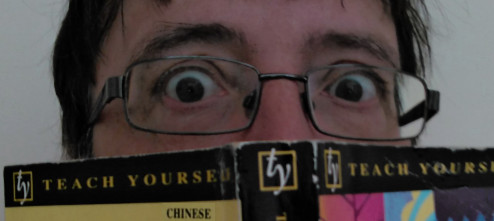When my wife told me she’d been offered a job in Beijing, the first thing I did was go to the library and borrow all their “Teach Yourself Chinese” courses. I listened to the CDs in the kitchen and in the car, and dutifully repeated the conversations, an alarming number of which seemed to revolve around a western man chatting up a Chinese woman. Ni xiang qu he wo nar ma? I think my wife got quite worried.
Nonetheless, I stuck to my task. I learned my vocabulary, practised my tones, and when friends asked me if I spoke any Chinese, would smugly pronounce Wo hui shuo yidianr putonghua…
Then we arrived in China, and reality hit me in the face. I couldn’t understand anything, and couldn’t make myself understood. Instead of the careful articulation of the actors on the CDs, I was confronted by the authentic voice of Beijing: drawling, rasping, and more or less entirely free of consonants, like a consumptive pirate with a mouthful of toffee. My mangled attempts at Mandarin were met with incomprehension, bemusement and contempt.
After several panic-inducing encounters, I realized the Teach Yourself books were deceiving me. I will never engage in cheery conversations with waiters, but instead will always have to order by grunting while stabbing a finger at pictures on the menu, like a chimp in a 1970s psychology experiment. In fact, I learned, you can get by with just five phrases. So, to save you time and money, I present the only language course you will ever need: Actually Useful Mandarin Chinese Made Easy.
1. Ni hao. “Hello. Please don’t talk to me.”
2. Wo ting bu dong. "I have no idea what you just said to me, and I can’t be entirely certain what I said to you. I am completely out of my depth here."
3. Wo zhi shi kankan. "I’m just staring in confusion at the things in your shop. Frankly I don’t know what many of them are, and you waving things under my nose and shouting at me is unlikely to lead to a successful transaction."
4. Xie xie. "I’m not sure what happened here, but I’m hoping that a response of abject gratitude will get me out of it with some degree of dignity."
5. Zai jian. “I’m going home now to hide in a cupboard.”
About the Author
Andrew Killeen is a novelist and creative writing teacher. He was born and brought up in Birmingham, England, studied English Literature at Cambridge University and now lives in Beijing with his wife and two sons, aged 10 and 6. In the UK he ran a weekly writers’ group, founded a literary festival and lectured in creative writing at Coventry University. He is also a qualified positive parenting practitioner. In his spare time he is a musician and DJ, and enjoys watching soccer and cricket, playing poker, and pontificating on social media. His critically acclaimed historical novels are available from Dedalus Books.




